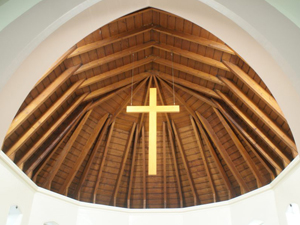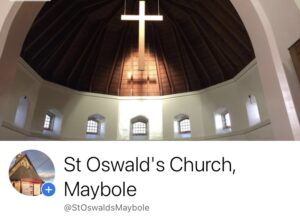Sermon preached by the Rt Rev Dr Gregor Duncan, Bishop of Glasgow & Galloway, at St Oswald’s Maybole on the feast of Saint Oswald, Sunday 5 August 2018.
St John 15.4: ‘Jesus said “Abide in me as I abide in you…”‘
Those the Church calls saints are supremely those who, through the ages in countless different times and places and cultures, have most fully exemplified the state of being described by Jesus in this text. They have known Christ in the depths of their being and have lived in unbroken communion with Him. And because of that way of being they have done what the prophet says is required of all God’s people – they have done justice, loved mercy and walked humbly with their God. And because of that way of being they have certainly been seen to have followed the advice of the apostle, girding themselves with the belt of truth, the shield of faith, the helmet of salvation, the breastplate of righteousness and being persistent in prayer for God’s people.
Your patron saint, Oswald, was such a one. His story can be told quite simply. He lived and died in 7th Century England, but his Christian faith was nurtured by the community in Iona to which he fled after a coup in his father’s kingdom of Northumbria. After 17 years in exile, he returned to Northumbria, was victorious in battle and became king. He ruled for only eight years, being killed in another battle at the age of only 38 by a pagan king, Penda of Mercia. As king, his policy was to Christianize his kingdom. A modern scholar puts it like this: “….he sent for a bishop from Iona to preach the Gospel in Northumbria. First, a severe bishop was sent, who met with no success among people whom he considered barbarous and obstinate. He was soon replaced by the kindly Aidan whose sermons Oswald himself interpreted and to whom he gave the island of Lindisfarne for a monastery and episcopal seat, close to the royal residence of Bamburgh. Aidan met with great success; numerous Northumbrians became Christians and Christianity was established…”
As is often the case with saints, what happened after Oswald’s death is at least as interesting and instructive as the events of his lifetime. After his untimely death his body was mutilated; the head, arms and hands being hung up on stakes. But, these bits of St Oswald were recovered and then venerated in many different places, leading to a great diffusion of his cult. So, the head went to Lindisfarne, some bits found their way to Germany, the arms first went to Bamburgh but were later stolen and ended up in Ely. In the end, 62 churches were dedicated in his name in England, including Hexham and Carlisle, and he is even commemorated at Prague, Bamberg and Regensburg. The same scholar I quoted earlier sums it up: “his cult eventually extended to Scotland, Ireland, Portugal, Bohemia, Holland, Germany and Switzerland. He was remembered as one of England’s national heroes; his bravery and military skill, his generosity and piety, together with an early death in battle for his country and his faith combined the attributes of Anglo-Saxon hero and Christian saint.”
I mention all of this because it seems to me that, one way or another, Oswald, just because he knew Christ in the depths of his being and lived in unbroken communion with him, remained a living presence in the community of faith – church dedications all over the place and the diffusion of his relics focus that for us. For, after all, saints are not just good, dead Christians of the past – not at all; rather they continue fully alive in Christ and are our living partners in the community of faith which unites us in Christ’s heaven and earth. And, thinking of Oswald as your patron saint, dead and gone patrons are not much help to the living, whereas patrons who are part of our community certainly can be of help in encouraging us along the way of their Lord and ours. So, in this matter of saints, I want to end by suggesting to you a threefold significance in our lives for saints: the way they lived and followed Jesus in their living as an encouragement to us, showing that with us dwelling in Christ and He is us, all matter of wonderful things are possible; our present Communion and fellowship with them strengthening us in our apparent weakness, reminding us that we are not alone but surrounded by a great cloud of witnesses; and, finally, since they live in Christ, they must also pray in Christ, and we can find ourselves helped by their prayers. It is good to ponder these things, all stemming from those who abide in Christ and in whom Christ abides, on a patronal festival such as this.



